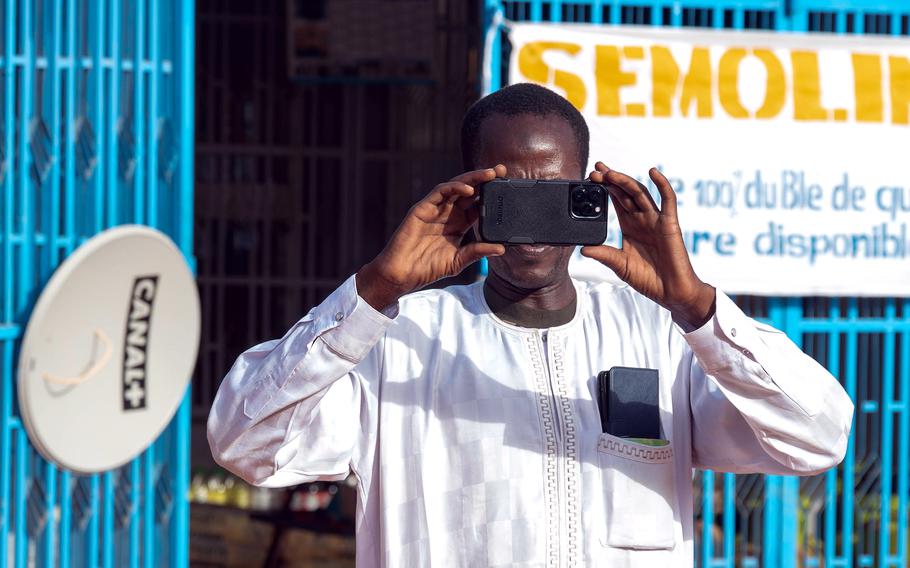
A man takes a cellphone photo in Niamey, Niger, on May 6, 2023. Russia is driving a surge of disinformation campaigns in Africa, according to a report this month from a Pentagon-linked think tank. The campaign includes paid African influencers, digital avatars and the circulation of fake videos and photographs, researchers said. (Amy Younger/U.S. Air Force)
Russia is leading a surge of disinformation campaigns in Africa, using paid social media influencers and other tactics to promote and validate coups in places like Niger, according to new research by a Pentagon-affiliated think tank.
The report by the Africa Center for Strategic Studies comes amid the U.S. military’s struggle to maintain influence in western Africa, where the Kremlin is seeking to gain a foothold.
Disinformation operations on the continent have surged nearly fourfold since 2022, said the report, which was issued earlier this month.
Such campaigns “have directly driven deadly violence, promoted and validated military coups, cowed civil society members into silence, and served as smokescreens for corruption and exploitation,” it said.
Events in Niger, which the report identifies as a hot spot for Russian disinformation, bring into focus the stakes for the Pentagon.
It developed a $110 million drone base in the country to counter Islamic extremism, and Niger was the top American partner in the region until a July military coup upended the arrangement.
And on Saturday, the country’s ruling junta said it wants U.S. forces out, creating uncertainty for the future of the mission and the 1,000 personnel still in Niger.
Before, during and after the coup there, Russian information operations were in full swing as Moscow sought to capitalize on instability in the country, according to the report.
The Russian disinformation strategy involves everything from paid African influencers to digital avatars and the circulation of fake videos and photographs, according to the authors of the report.
It cited two influencers connected to Russia who have a combined following of over 28 million users. In turn, that content has been amplified by “a sprawling ecosystem of hundreds of Russian-linked accounts and pages.”
Pro-Russia operatives follow a playbook developed decades ago for using what the Kremlin calls “active measures” in an effort to destabilize targeted countries.
The phenomenon took on new life in the wake of the 2014 invasion of Ukraine and subsequent annexation of Crimea by Russia. Kremlin bots and trolls overwhelmed comment threads in Western media outlets’ reporting and social media feeds.
It has continued apace ever since, with the Russian attempts to subvert the 2016 U.S. presidential election being the most high-profile example.
U.S. Africa Command’s Gen. Michael Langley said in Senate testimony earlier this month that Russia wants a foothold to project power there and access the continent’s vast mineral wealth.
Africa has seen a rapid expansion of access to social media in the past seven years, and now roughly 300 million Africans have joined various platforms, according to the report.
Russia is the main purveyor of disinformation in Africa, sponsoring 80 documented campaigns targeting more than 22 countries, the report said. That represents nearly 40% of all disinformation campaigns in Africa.
China was the second-biggest spreader of disinformation, according to the study.